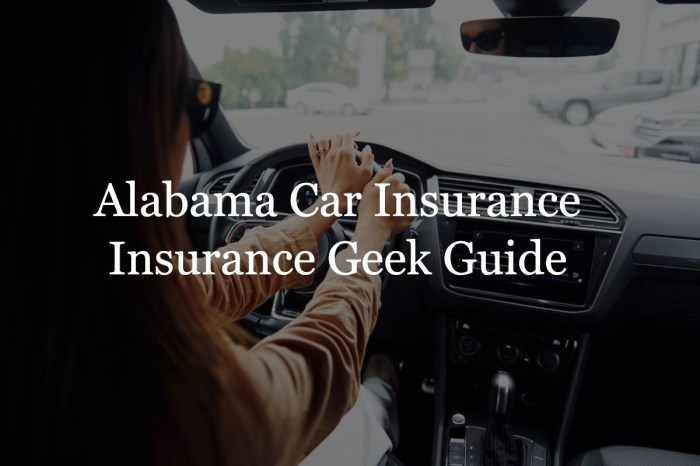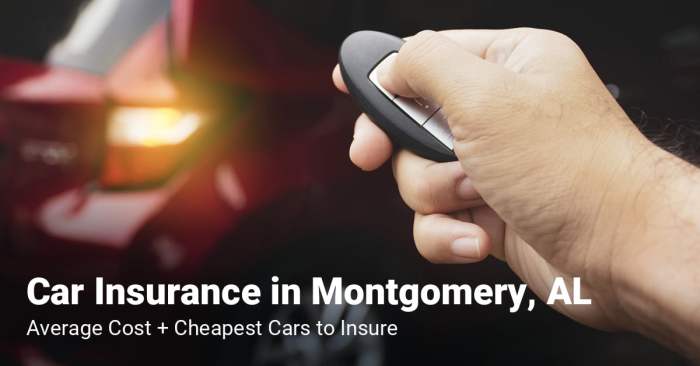Securing the right car insurance in Alabama is crucial for responsible drivers. This guide delves into the intricacies of Alabama’s car insurance landscape, providing a clear understanding of minimum requirements, cost factors, and the process of choosing and utilizing coverage. We’ll explore various policy types, the impact of driving history and location, and strategies for finding the best rates. Whether you’re a new driver or a seasoned one, this resource aims to empower you with the knowledge needed to make informed decisions about your auto insurance.
Understanding Alabama’s specific regulations and the factors that influence premiums is key to obtaining affordable and adequate coverage. This guide will equip you with the tools to navigate the complexities of the insurance market and secure the protection you need on the road.
Understanding Alabama’s Car Insurance Requirements

Driving in Alabama requires understanding the state’s car insurance laws to ensure you’re legally protected and avoid penalties. This section details Alabama’s minimum insurance requirements, liability coverage limits, and the consequences of driving without adequate coverage.
Alabama’s Minimum Car Insurance Requirements
Alabama mandates minimum liability coverage for all drivers. This means you must carry insurance that covers the costs of injuries or damages you cause to others in an accident. Failing to maintain this minimum coverage can result in significant legal and financial repercussions. The specific requirements ensure a basic level of protection for other drivers and their property. The state’s focus is on ensuring that those harmed in accidents caused by uninsured drivers are compensated to the extent possible.
Liability Coverage Limits in Alabama
Alabama’s minimum liability coverage consists of 25/50/25. This means your insurance policy must provide at least $25,000 in coverage for bodily injury per person injured in an accident, $50,000 in total bodily injury coverage per accident, and $25,000 in property damage coverage per accident. These limits are the minimum required by law, but many drivers opt for higher limits to provide greater protection in the event of a serious accident. Higher limits offer greater financial security and can significantly reduce your personal liability in the event of a costly accident.
Penalties for Driving Without Adequate Insurance in Alabama
Driving without the minimum required insurance in Alabama carries several serious consequences. These penalties are designed to incentivize compliance with the state’s insurance laws and protect the public. These penalties can include significant fines, license suspension, and even jail time, depending on the circumstances and the severity of the offense. Furthermore, an uninsured driver is fully responsible for all damages and injuries resulting from their actions in an accident, even if the accident wasn’t their fault.
Comparison of Car Insurance Coverage Types in Alabama
Understanding the different types of car insurance coverage available is crucial for making informed decisions about your protection. The table below compares common coverage options:
| Coverage Type | Description | Minimum Requirement (Alabama) | Benefits |
|---|---|---|---|
| Liability | Covers injuries and damages you cause to others. | 25/50/25 | Protects you from lawsuits and financial ruin resulting from accidents you cause. |
| Uninsured/Underinsured Motorist | Covers injuries and damages caused by an uninsured or underinsured driver. | Not Required (but highly recommended) | Protects you if you’re involved in an accident with a driver who lacks sufficient insurance. |
| Collision | Covers damage to your vehicle in an accident, regardless of fault. | Not Required | Pays for repairs to your car, even if you cause the accident. |
| Comprehensive | Covers damage to your vehicle from non-collision events (e.g., theft, vandalism, weather). | Not Required | Protects your vehicle from various risks beyond accidents. |
Finding and Choosing a Car Insurance Provider in Alabama

Selecting the right car insurance provider in Alabama is crucial for securing adequate coverage at a competitive price. Numerous factors influence this decision, including coverage options, customer service, and financial stability. Understanding the landscape of available providers and their offerings is key to making an informed choice.
Reputable Car Insurance Companies in Alabama
Several reputable car insurance companies operate throughout Alabama, offering a range of coverage options and services. Choosing a provider involves considering factors such as price, coverage, and customer reviews. It is advisable to compare quotes from multiple companies to find the best fit for your individual needs.
Obtaining Car Insurance Quotes
The process of obtaining car insurance quotes is straightforward. Most companies allow you to receive quotes online through their websites. You’ll typically need to provide information about your vehicle, driving history, and desired coverage levels. It’s recommended to gather quotes from at least three different companies to compare prices and coverage options. Contacting companies directly via phone or visiting their offices is another way to obtain quotes. Remember to ensure you are comparing apples to apples—the same coverage levels across providers.
Comparison of Car Insurance Services in Alabama
Alabama car insurance companies offer varying levels of service and coverage. Some may specialize in specific types of coverage, such as classic car insurance or high-value vehicle insurance, while others focus on broader customer bases. Customer service responsiveness and the availability of online tools and mobile apps also differ significantly. Some companies may offer discounts for good driving records, safety features, or bundling insurance policies.
Key Features and Benefits of Different Alabama Car Insurance Companies
| Company Name | Key Features | Benefits |
|---|---|---|
| State Farm | Wide range of coverage options, extensive agent network, strong financial stability. | Reliable coverage, convenient access to agents, strong reputation. |
| GEICO | Competitive pricing, online quote and management tools, 24/7 customer service. | Cost-effective insurance, ease of use, readily available support. |
| Progressive | Name Your Price® Tool, various discounts, robust online resources. | Customization options, potential cost savings, comprehensive online tools. |
| Allstate | Strong brand recognition, various coverage options, local agents. | Trusted reputation, personalized service, flexible coverage choices. |
| USAA | Excellent customer service, competitive rates (for military members and families). | High customer satisfaction, potentially lower premiums for eligible members. |
Illustrative Scenarios

Understanding how Alabama’s car insurance requirements play out in real-world situations is crucial. The following scenarios illustrate the claims process for both minor and major accidents. Remember, these are examples, and the specifics of each case can vary significantly.
Minor Car Accident Claim
This scenario involves a minor fender bender. Sarah, driving her 2018 Honda Civic, lightly bumped into another car at a stoplight, causing minimal damage to both vehicles – a small scratch on her bumper and a dented rear panel on the other car. No one was injured. Sarah immediately exchanged information with the other driver, including driver’s licenses, insurance details, and contact information. She then took photos of the damage to both cars and the surrounding area. Sarah contacted her insurance company, reporting the accident and providing all the collected information. Her insurer initiated a claim, and both parties agreed on a settlement amount to cover the repairs. Sarah’s insurance covered the repairs to her vehicle, and the other driver’s insurance handled their vehicle’s repairs. The process was relatively straightforward and resolved within a few weeks.
Major Car Accident Claim
This scenario depicts a more serious incident. John, driving his 2021 Ford F-150, was involved in a major collision at a highway intersection. The accident resulted in significant damage to both vehicles and injuries to John and the other driver. John sustained a broken arm and required surgery. The other driver suffered a concussion and whiplash. John immediately called emergency services, and both parties were transported to the hospital. Police attended the scene and filed a report. John’s insurance company was notified immediately. The claim process involved detailed documentation of injuries, medical bills, lost wages, and vehicle repair costs. John’s insurer worked with the other driver’s insurer and their respective legal teams to determine liability and settle the claim. This process was considerably more complex and lengthy, involving medical evaluations, legal representation, and negotiations. The settlement eventually covered John’s medical expenses, lost wages, vehicle repairs, and pain and suffering. The timeline for resolution extended over several months.
Summary
Successfully navigating the world of Alabama car insurance requires careful consideration of several key factors. From understanding minimum requirements and the influence of your driving record to selecting the right coverage and filing claims effectively, this guide has provided a comprehensive overview. Remember to compare quotes from multiple providers, understand the nuances of different policy types, and prioritize securing adequate coverage to protect yourself and your assets. By taking a proactive approach, you can ensure you have the right car insurance to meet your needs and navigate the roads of Alabama with confidence.
Q&A
What happens if I get into an accident and don’t have insurance?
Driving without adequate insurance in Alabama can result in significant penalties, including license suspension, fines, and even jail time. You would also be responsible for all accident-related costs.
Can I get car insurance if I have a bad driving record?
Yes, but it will likely be more expensive. Companies consider your driving history when calculating premiums. You might need to explore options with high-risk insurers.
How often can I change my car insurance provider?
You can typically switch providers whenever your current policy expires. Some companies may have cancellation fees, so check your policy details.
What is the difference between liability and collision coverage?
Liability covers damages you cause to others; collision covers damages to your vehicle regardless of fault.